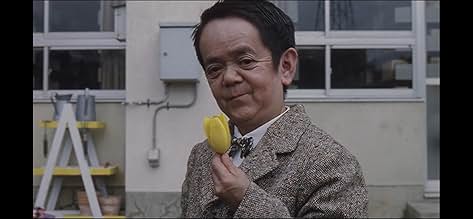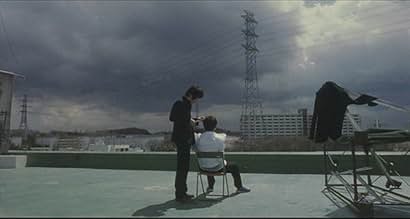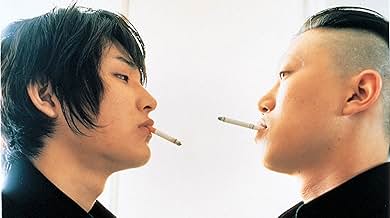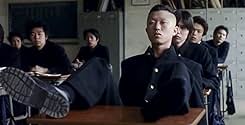AVALIAÇÃO DA IMDb
7,2/10
4,8 mil
SUA AVALIAÇÃO
Um grupo de estudantes decadentes do ensino médio de Tóquio enfrenta as dificuldades de crescer, se distanciar de seus amigos e se preocupar com seu futuro, enquanto vive em um ambiente alta... Ler tudoUm grupo de estudantes decadentes do ensino médio de Tóquio enfrenta as dificuldades de crescer, se distanciar de seus amigos e se preocupar com seu futuro, enquanto vive em um ambiente altamente violento.Um grupo de estudantes decadentes do ensino médio de Tóquio enfrenta as dificuldades de crescer, se distanciar de seus amigos e se preocupar com seu futuro, enquanto vive em um ambiente altamente violento.
- Direção
- Roteiristas
- Artistas
- Prêmios
- 1 vitória e 2 indicações no total
Yûsuke Ôshiba
- Kimura
- (as Yûsuke Ohshiba)
Eita Nagayama
- Obake (Ghost)
- (as Eita)
- Direção
- Roteiristas
- Elenco e equipe completos
- Produção, bilheteria e muito mais no IMDbPro
Avaliações em destaque
The closing night movie for the SF Indie Fest is a vaguely coming of age type drama, set entirely within the grounds of a Japanese boy's school. Here, the kids all run around in gangs, sleep in lectures and fight at break times. Every wall in the place is covered in graffiti. Ryuhei Matsuda (the effeminate guy from GOHATTO) stars as Kuja, a senior who becomes the school's official gang leader by winning at "The Clapping Game". This game involves the kids hanging from a railing on the edge of the school roof, letting go and seeing how many times they can clap their hands before their nerve fails and they grab back on.
From here we follow the progress of his friends and enemies throughout a part of the school year, the challenges to his leadership and the pressure of the school system felt by everyone. There's a hell of a lot of violence goes on in the school, and we get the impression that life as a Japanese school boy is a difficult dangerous business.
It's a pretty bleak and cheerless vision - between this and BATTLE ROYALE you'd be forgiven for thinking that the Japanese school system was on the point of explosion or collapse, with the youth as disaffected as they come. How close this is to reality I don't know, but the friend I saw it with tells me that the classroom scenes are pretty close to how it actually is.
The cast all perform well - Ryuhei Matsuda has such a striking appearance that he doesn't really need to do anything to create an impression, and indeed he spends most of the movie being aloof and impenetrable. This contrasts with the energies and frustrations evident in the other characters, particulary his best friend Aoki.
I enjoyed the movie a lot... good characters, and well filmed/scored, with interesting developments. It's based on a collection of autobiographical short stories from a manga artist, which shows a little bit in the episodic nature of the plot, but it's all weaved together well for the movie. Worth looking out for if you don't mind your high school movies nihilistic, violent and bleak.
From here we follow the progress of his friends and enemies throughout a part of the school year, the challenges to his leadership and the pressure of the school system felt by everyone. There's a hell of a lot of violence goes on in the school, and we get the impression that life as a Japanese school boy is a difficult dangerous business.
It's a pretty bleak and cheerless vision - between this and BATTLE ROYALE you'd be forgiven for thinking that the Japanese school system was on the point of explosion or collapse, with the youth as disaffected as they come. How close this is to reality I don't know, but the friend I saw it with tells me that the classroom scenes are pretty close to how it actually is.
The cast all perform well - Ryuhei Matsuda has such a striking appearance that he doesn't really need to do anything to create an impression, and indeed he spends most of the movie being aloof and impenetrable. This contrasts with the energies and frustrations evident in the other characters, particulary his best friend Aoki.
I enjoyed the movie a lot... good characters, and well filmed/scored, with interesting developments. It's based on a collection of autobiographical short stories from a manga artist, which shows a little bit in the episodic nature of the plot, but it's all weaved together well for the movie. Worth looking out for if you don't mind your high school movies nihilistic, violent and bleak.
I think it captured the high school feeling of despair better than any other movie. The high school movies I am used to usually transform everything into a battle between characters where in the end the good guy wins. Or maybe he loses. But what if you don't want a battle? What if you just don't know what to do or you just don't care?
In Aoi Haru a deadly game decides who the leader of the school will be. A lonely quiet guy wins the game, but he does it only because he doesn't care enough to fear for his life. He actually does it for the game, not for the leadership. That annoys the hell out of his friend, ex boss himself, who can't understand someone that does not want to abuse his power. In the end their friendship is brutally ended.
There are some interesting metaphors in there, like the flowers that the boys are trying to grow, even if just one of them lives to see them blossom. It is also interesting that it is a boys only high school, maybe that's the norm in Japan, I don't know.
There is also in the movie the hidden message that neglect and inaction can do more damage than acting badly. I am talking here about the teachers in the film, that are just dictating machines with no will to educate or care. I mean, doctors can be accused of malpraxis. Lawyers, too. Yet teachers, who are supposed to create social beings from adolescents, are not held responsible for their mistakes.
Enough babble. This is a good film, maybe a bit long, but it does need almost every scene. The soundtrack is also very nice and fits the plot. It is worth watching.
In Aoi Haru a deadly game decides who the leader of the school will be. A lonely quiet guy wins the game, but he does it only because he doesn't care enough to fear for his life. He actually does it for the game, not for the leadership. That annoys the hell out of his friend, ex boss himself, who can't understand someone that does not want to abuse his power. In the end their friendship is brutally ended.
There are some interesting metaphors in there, like the flowers that the boys are trying to grow, even if just one of them lives to see them blossom. It is also interesting that it is a boys only high school, maybe that's the norm in Japan, I don't know.
There is also in the movie the hidden message that neglect and inaction can do more damage than acting badly. I am talking here about the teachers in the film, that are just dictating machines with no will to educate or care. I mean, doctors can be accused of malpraxis. Lawyers, too. Yet teachers, who are supposed to create social beings from adolescents, are not held responsible for their mistakes.
Enough babble. This is a good film, maybe a bit long, but it does need almost every scene. The soundtrack is also very nice and fits the plot. It is worth watching.
so i decided to get around to watching this after seeing a pretty screencap from the film and googling it, reading a synopsis that sounded interesting and finding out that it had a cult following among both western and Japanese fans. i've viewed the film and *gasp* dear god my opinion is blasphemous--i really wasn't a fan. I was surprised to only see one other negative user review thinking it was my fault but nah not really. FIRST, i enjoyed the cinematography, acting and score. the j-alt/punk rock soundtrack was amazing utilized, not a lot of diversity but it was as rattly and raw as what was unfolding on the screen so props for that. the acting was also nothing crazy but the nihilistic tones of the film were conveyed very well with sincere acting that depicted withdrawn yet oddly human characters. the imagery and overall cinematography was quite beautiful, and visually it was pleasant to watch; special mention to the sakura porn that popped up every once in a while because those were especially beautiful but thats just my inner weeb talking. BUT i really wasn't a fan of the actual characters and plot. i thought they were icy--and i'm not talking reserved icy--i mean detached, disconnected and barely relatable. so as the events were unfolding throughout the film, i didn't really care to keep up with the people at the centre of the conflicts. i also didn't like the plot as it was vague with seemingly random events at times. i've seen other reviews defending the film saying its a fascinating take on disillusioned teenage Japanese boys a-la battle royale and how they struggle to find their meaning as adults blah blah blah. i'm not going to argue against that, i've just seen similar ground covered in related works that make this film look weak and barely pointed. if anyone's seen suicide club, i think that touched on similar themes but really drove the meaning home. in terms of trying to find one's place, NANA & a bunch of other manga series make a much greater effort and execute their message effectively. i didn't see that in this film, and a bit of metaphor and musing from characters for 5 minutes max definitely doesn't interest me towards the whole coming-of-age story its trying to push. maybe i don't get it, maybe if i was Japanese it would make more sense but i've enjoyed works in a similar vein and found little to love with blue spring (aoi haru)
If one pays scant attention to the news in Japan, seen Iwai Shunji's _All About Lily Chou Chou_, or read short stories and novels by Murakami Ryu, one knows that Japan, like other countries, suffers from an escalation of violence in schools. This violence works in three ways: student vs. teacher, teacher vs. student, and, the most common, student vs. student. Although it is still rare, the newspapers and news programs are peppered with stories of bullies beating someone to death or the bullied killing his bullies. Murakami Ryu and Yu Miri have both focused on these subjects in their literary works. Toyoda Toshiaki, through his film _Blue Spring_ also touches on this controversial subject.
The kids attending the all boys Asahi High School would basically be considered the dregs of Japanese society. The school is rundown and the teachers teach such a drypan, apathetic manner that it is not surprising that the kids could care less. The only teacher who seems to actually care about any of his students is a dwarf who waters the flowers on the school grounds all day.
However, although the teaching might be unstructured, there is a rigid code of hierarchy enforced by the tough kids. A leader is chosen by a suicidal ritual in which a student claps his hands as many times as possible while falling backwards. After he claps a certain amount of times, he grabs the guardrail. Miss the guardrail, instant pancake.
At the beginning of this film, after the "graduation" of the senior class, Kujo, played by the extraordinarily handsome Matsuda Ryuhei, wins the contest. Kujo is a bit indifferent to his new found power, but goes along with it because he has the support of his friends: Aoki, Yukio, Yoshimura, and Kimura.
Although many of the students are not satisfied with the way their lives are shaping, they seem to basically concede that good jobs and college are not in their future and that they are either on the track to become either a menial laborer or a member of the Yakuza.
_Blue Spring_ is an interesting film that depicts individuals who are not on the "normal road of becoming a good Japanese citizen": i.e. Graduation, work, stable family. It shows the dregs, but the dregs also show that social hierarchy exists from the lowest to the highest.
I think that the film is quite well done. The filming is dark, but it fits the atmosphere of the film. The soundtrack is excellent.
The kids attending the all boys Asahi High School would basically be considered the dregs of Japanese society. The school is rundown and the teachers teach such a drypan, apathetic manner that it is not surprising that the kids could care less. The only teacher who seems to actually care about any of his students is a dwarf who waters the flowers on the school grounds all day.
However, although the teaching might be unstructured, there is a rigid code of hierarchy enforced by the tough kids. A leader is chosen by a suicidal ritual in which a student claps his hands as many times as possible while falling backwards. After he claps a certain amount of times, he grabs the guardrail. Miss the guardrail, instant pancake.
At the beginning of this film, after the "graduation" of the senior class, Kujo, played by the extraordinarily handsome Matsuda Ryuhei, wins the contest. Kujo is a bit indifferent to his new found power, but goes along with it because he has the support of his friends: Aoki, Yukio, Yoshimura, and Kimura.
Although many of the students are not satisfied with the way their lives are shaping, they seem to basically concede that good jobs and college are not in their future and that they are either on the track to become either a menial laborer or a member of the Yakuza.
_Blue Spring_ is an interesting film that depicts individuals who are not on the "normal road of becoming a good Japanese citizen": i.e. Graduation, work, stable family. It shows the dregs, but the dregs also show that social hierarchy exists from the lowest to the highest.
I think that the film is quite well done. The filming is dark, but it fits the atmosphere of the film. The soundtrack is excellent.
I'm going to keep it short: I do hope this movie doesn't die out along with the jap trend as it is really worth seeing, especially if you are around (or just past the age of the protagonists) or planning to be involved in education. It's got great yet simple symbolism and a teenage-angst ridden realism that isn't try-hard. If you have experienced anything close to that kind of school envimeronment, it hits home. If you have been as privileged as not to, then it might prove to be quite eye-opening. In other words, it is food for thought, paired with a killer soundtrack, that embraces and escalates the feelings of each scene: be it angst, sadness, pressure or the very abscense of any of them.
Você sabia?
- CuriosidadesIn the scene where Kimura gives his blazer to the baseball club freshman before climbing over the fence to join the Yakuza, there is Japanese writing embroidered on the jacket lining. This is the same poem that Kimura reads out in voiceover during the subsequent shots of him getting in the car.
- ConexõesVersion of Revolver - Aoi haru (2003)
- Trilhas sonorasDrop
Performed by Thee Michelle Gun Elephant
Principais escolhas
Faça login para avaliar e ver a lista de recomendações personalizadas
- How long is Blue Spring?Fornecido pela Alexa
Detalhes
Bilheteria
- Orçamento
- US$ 800.000 (estimativa)
- Tempo de duração1 hora 23 minutos
- Cor
- Proporção
- 1.85 : 1
Contribua para esta página
Sugerir uma alteração ou adicionar conteúdo ausente

Principal brecha
By what name was Primavera Azul (2001) officially released in India in English?
Responda





















